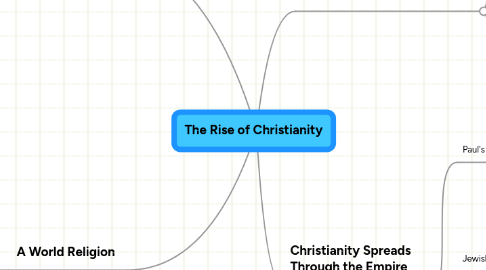
1. The Life and Teachings of Jesus
1.1. Jesus' Message
1.1.1. At the age of 30 Jesus began his public ministry
1.1.2. Jesus emphasized God's personal relationship to each human being
1.1.3. One God. Ten Commandments.
1.2. Jesus' Death
1.2.1. Some groups greeted him as the Messiah, like the Apostles
1.2.2. Pilate arrested Jesus and sentenced him to be crucified
1.2.2.1. The cross became a symbol of their beliefs
2. A World Religion
2.1. Early Christian Church
2.1.1. The apostle Peter traveled to Rome and became the first bishop of Rome
2.1.2. A bishop was the leader of a whole church
2.2. Constantine Accepts Christianity
2.2.1. Constantine was fighting three rivals for his title of Roman emperor
2.2.2. Constantine announced an end to the persecutions of Christians in 313 A.D
2.3. Discord and Harmony
2.3.1. In an attempt to end confilct church leaders set a single, official standard of belief
2.3.2. Anything that went against popular belief was deemed "heresy".
2.3.3. "Nicene Creed" defined these basic beliefs.
2.4. The Fathers of the Church
2.4.1. Augustine taught that God was merciful.
2.4.2. Wrote that the fate of cities such as Rome was not important. As the city of God would never be destroyed.
3. Jews Come Under Roman Rule
3.1. Jewish Kingdom
3.1.1. First Jewish kingdom remained independent
3.1.2. Jews revolted against Roman rule
3.1.2.1. Rome took control of the Jewish kingdom and made it the province of Judea
3.2. Religious Matters
3.2.1. They were divided into two major factions
3.2.1.1. Zealots wanted to rid their homeland of Romans
3.2.1.2. Another group that the Messiah was soon to appear
4. Christianity Spreads Through the Empire
4.1. Paul's Mission
4.1.1. He was an Apostle with a large influence on Christianity development
4.1.2. His message was safely during the Pax Romana
4.2. Jewish Rebellion
4.2.1. In 66 A.D the Zealots rebelled against Rome
4.2.2. In 70 A.D the Romans stormed Jerusalim and destroyed the Temple complex
4.2.3. The dispersal of Jews was called the Diaspora
4.3. Persecution of the Christians
4.3.1. Christians refused to worship Roman Gods
4.3.2. When the Pax Romana ended, the Romans exiled, imprisoned or executed Christians for not worshipping Roman Gods
